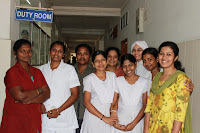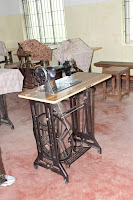Day 8 – 12/19/2012 The health of India’s people
 Today’s focus was on the
health care of the residents of Kerala.
Alka Thomas, a young woman with her nursing degree, joined me as I went
to a local hospital, Alphonsa Hospital, the Samaritan College of Nursing, and
to a small clinic run by Dr. George.
Today’s focus was on the
health care of the residents of Kerala.
Alka Thomas, a young woman with her nursing degree, joined me as I went
to a local hospital, Alphonsa Hospital, the Samaritan College of Nursing, and
to a small clinic run by Dr. George. India's government provides medical care for its citizens including immunizations for children. Nurses do go to homes to check in on folks, especially expecting mothers to make sure they are getting their vitamin pills, etc. Dental care is also available. The cost for visits is minimal, 10 rupees and medicine is free.
One of the side effects of getting
in front of the locals and singing and then going to the next day is a number of
nurses recognized me commented on our performance. They were all very gracious and polite about it.
Alka gave me a tour of her college.
From her perspective, there are not enough job opportunities, the pay is low, and
there is a lack of respect for the nursing profession. The 4-year school has about 50 students in each
grade. I got to see the library where there
was 1 computer and books were checked out using paper cards. From my 3 experiences
with school libraries, it seems libraries and reading focus more on informational
purposes and are basic in set-up. Reading for leisure does not seem to play a significant
role in the school setting or at home.
Spending
time with Alka gave me a chance to see India from her generation. She is now working on her psychology degree via
a distance learning course. Her goal is to
graduate and work for a couple of years before getting married. The culture of Kerala does not promote dating but
does support love marriages. The families
still have to approve. This might seem a
bit harsh but their divorce rate is much lower than ours.
 Sr. Rubeena, the principal of
the college is a hoot. One of our conversations
was about the impact the 2 children household has on many aspects of life. There is a domino effect from the hyper-focus
of parents on the 2 to an increase in abortions and lack of work ethics when it
comes to professions in nursing where care and empathy are needed components. Because of the decrease in the number of children,
fewer girls are joining the convent. She
is not sure what the future will hold for nurses or nuns. I appreciate her frankness because it is not always
possible to have an open discussion with someone from a different culture or country.
I think we are facing similar issues - we
have a generation of children where many lack an authentic purpose, real responsibilities,
and empathy for others.
Sr. Rubeena, the principal of
the college is a hoot. One of our conversations
was about the impact the 2 children household has on many aspects of life. There is a domino effect from the hyper-focus
of parents on the 2 to an increase in abortions and lack of work ethics when it
comes to professions in nursing where care and empathy are needed components. Because of the decrease in the number of children,
fewer girls are joining the convent. She
is not sure what the future will hold for nurses or nuns. I appreciate her frankness because it is not always
possible to have an open discussion with someone from a different culture or country.
I think we are facing similar issues - we
have a generation of children where many lack an authentic purpose, real responsibilities,
and empathy for others. 
 Dr. George, a general practitioner,
met us in his home since we did not arrive until after his office hours - 10 am
to 1:30 pm. His home is right next to the clinic.
Dr. George, a general practitioner,
met us in his home since we did not arrive until after his office hours - 10 am
to 1:30 pm. His home is right next to the clinic. 

 After the medical visits, I met
up with the rest of the Bellarmine folks and toured the neighbor housing sponsored
by the friary Kolbe Franciscan Ashram.
The area around the ashram had been mostly inhabited by Muslims and Hindus
with a bit of unrest. The friary thought
that including a 3rd group, Christians, could help balance the neighborhood. It took time to build the trust needed for an
integrated neighborhood, but now about 30 homes have been built. The friary owns the land and the houses. The selected residents paid a fee to live
there and can add to the building but are not to sell the house or property. Families can "hand down" their
rights to live in the home to their children - perpetuity rights. They are simple houses basically made up of 2
rooms, 1 bedroom and living area, & a kitchen.
After the medical visits, I met
up with the rest of the Bellarmine folks and toured the neighbor housing sponsored
by the friary Kolbe Franciscan Ashram.
The area around the ashram had been mostly inhabited by Muslims and Hindus
with a bit of unrest. The friary thought
that including a 3rd group, Christians, could help balance the neighborhood. It took time to build the trust needed for an
integrated neighborhood, but now about 30 homes have been built. The friary owns the land and the houses. The selected residents paid a fee to live
there and can add to the building but are not to sell the house or property. Families can "hand down" their
rights to live in the home to their children - perpetuity rights. They are simple houses basically made up of 2
rooms, 1 bedroom and living area, & a kitchen.  The friary also provides job skills for the
women (sewing lessons on treadle machines) and music lessons for the children. They follow the same tenants as Shanti Ashram -
educate the mother and the family will get educated.
The friary also provides job skills for the
women (sewing lessons on treadle machines) and music lessons for the children. They follow the same tenants as Shanti Ashram -
educate the mother and the family will get educated.
Before having dinner at the
ashram, we went to the Cherai Beach and watched the sunset. In short, we got to tickle our feet in the
Arabian Sea. The horizon was cloudy so
the sunset was rather short.
At the ashram, the whole group spent time with Dr. George and Sister Wilma, an obstetrician, to learn about the health care in India. There are basically 3 health care options - government hospitals, religious run hospitals, and private clinics. Hospitals here are basically clinics and vary in size. If a patient is not able to be handled at the clinic, they are referred to a private clinic. Government doctors are paid by the government and supplement their income via private practice out of their home. One source of income for doctors is to provide specialized and less costly services to folks abroad - it is a lot easier to get certain procedures here than in the states. Other issues facing India is alcoholism, cancer, and the government suggested family size - 2 children. India does not mandate family size but it does impact the family structure as well as the social structure of Kerala. Child brides are illegal in Kerala. A growing concern is care for the elderly. In the past, it is the son who takes care of the aging parents. A side effect of smaller families is the parents focus on getting the best education for both children, even daughters, resulting in both adult children working. Therefore no one is home to take care of aging parents. Sounds familiar to me.
At the ashram, the whole group spent time with Dr. George and Sister Wilma, an obstetrician, to learn about the health care in India. There are basically 3 health care options - government hospitals, religious run hospitals, and private clinics. Hospitals here are basically clinics and vary in size. If a patient is not able to be handled at the clinic, they are referred to a private clinic. Government doctors are paid by the government and supplement their income via private practice out of their home. One source of income for doctors is to provide specialized and less costly services to folks abroad - it is a lot easier to get certain procedures here than in the states. Other issues facing India is alcoholism, cancer, and the government suggested family size - 2 children. India does not mandate family size but it does impact the family structure as well as the social structure of Kerala. Child brides are illegal in Kerala. A growing concern is care for the elderly. In the past, it is the son who takes care of the aging parents. A side effect of smaller families is the parents focus on getting the best education for both children, even daughters, resulting in both adult children working. Therefore no one is home to take care of aging parents. Sounds familiar to me.




No comments:
Post a Comment